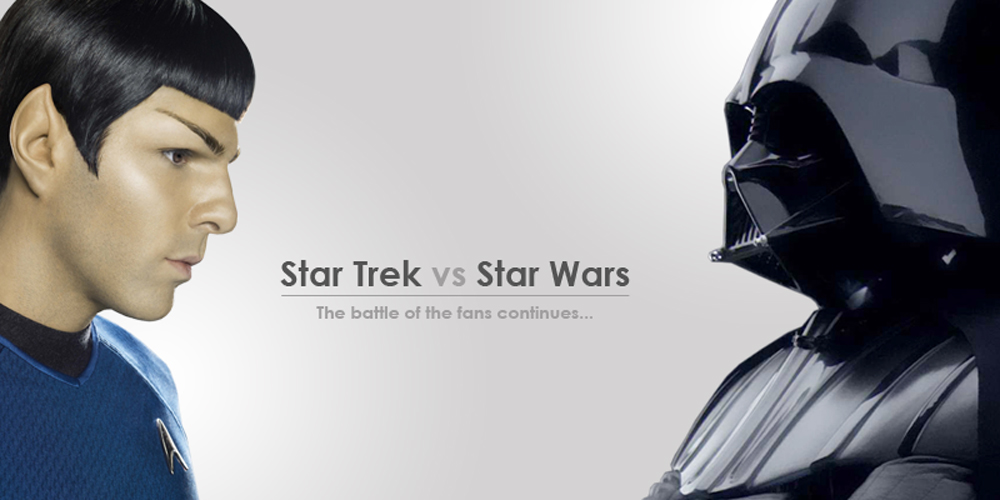In light of the release of the first trailer for the upcoming Star Wars movie, The Force Awakens, I thought it apropos to revisit an old controversy between the Star Wars and Star Trek franchises. For over 40 years now, fans of both Star Trek and Star Wars have been arguing about which movie franchise is better. Truthfully, the debate is substantiated, but at this point, it is a little old. Although, we can likely look forward to the reigniting of this debate as a result of the release of the new Star Wars movie. I, however, don’t want to talk about how the two franchises are different, but rather how they are similar.
Yes, significant differences in the plot and archetypes of the films would seemingly prohibit such a thing, but there are similarities that are noteworthy. Specifically, both stories deal with philosophical issues, Star Trek with ethics of space exploration and in Star Wars the philosophical issue at hand is about the choice between good and evil. Even still, both franchises reveal a complex plot through the contextual lens of the four basic types of conflict that can exist in a story, as a result, it’s possible that there is more alike between Star Wars and Star Trek then fans of each franchise would care to admit.
Man vs. Man
The inherent struggle with man vs. man is exemplified when characters are being pitted against each other. In the Star Trek franchise, the USS Enterprise crew (lead by Captain Kirk) would find regular conflict with adversaries, which would include the likes of Klingons, Ramulans, etc. Kirk and crew had to either defend themselves or defend the Federation from harm from evil empires like the Klingons or space warlords like Khan.
The same is true with Star Wars with respect to how Luke and the rebels found themselves in conflict with Emperor Palpatine and his forces, lead by Darth Vader. Luke Skywalker’s ultimate nemesis, however, is Darth Vader- his father, who he is trying to bring back to the light side of the force. His objective is then in direct opposition to the goal of Darth Vader. In order to accomplish this, Luke must overthrow the empire under the Emperor’s rule which creates a great struggle throughout the series.
Man vs. Himself
With man vs. himself, the conflict that exists is internal. While all forms of conflict make for great story telling, this particular type of literary conflict is more effectual as through these types of plot lines we can see the potential for greatness among the protagonist. In Star Trek, Captain Kirk’s internal conflicts are a bit harder to pinpoint given the inconsistencies in characterization as depicted in the earlier television series and movies (uber confident and damn near flawless) and the most recent reboot series (angry at the world). That being said, it seems as though the only consistent internal conflict that existed with the character is his persisting fear of failure, which only Spock and McCoy were aware of.
In Stars Wars, the protagonist walks a similar path, though his internal conflict arguably has more spiritual depth. Specifically, Luke Skywalker constantly struggles with personal demons and anger that pull him towards the dark side. This not only makes the character more relatable, but also endears the audience to his plight as he attempts to accomplish his goals.
Man vs. Society
With man vs. society, the inherent conflict is with a man-made institution, such as corrupt government. This is precisely the case with Star Wars, where the Luke Skywalker and his companions are rebelling against draconian rules of the empire, as set forth by Emperor Palpatine. They are fighting for freedom against a totalitarian fascist government.
With Star Trek, the demonstration of this conflict is much more subtle. Captain Kirk, and by omission his crew, would often find themselves in conflict with the prime directive, which prohibits members of the Starfleet Enterprise from meddling in alien development affairs. The most recent example can be seen in the Star Trek reboot movie, Into Darkness, where Captain Kirk risked revealing himself in an effort to save alien life on another planet.
Man vs. Nature
The last type of conflict that both franchises share is man vs. nature. With man vs. nature, the inherent struggles are external in nature and pit the protagonist, or hero, against the something in nature, such as an animal, or an act of nature, such as an earthquake. In both Star Trek and Star Wars, the biggest manifestation of this conflict harkens back to the philosophical premise of the stories; albeit weak.
For Star Trek, this is exemplified with Captain Kirk and his crew exploring space and the inherent dangers that arise as a result of happening upon the unknown, while in Star Wars, Luke Skywalker is faced with the dangers of the natural fauna of whatever planet that he and the rebels find themselves on. As a result, in both franchises, it is through the man vs. nature conflict that we see the true spirit of each story line and are reminded that man has much to learn about the universe and dealing with life forms in it.

